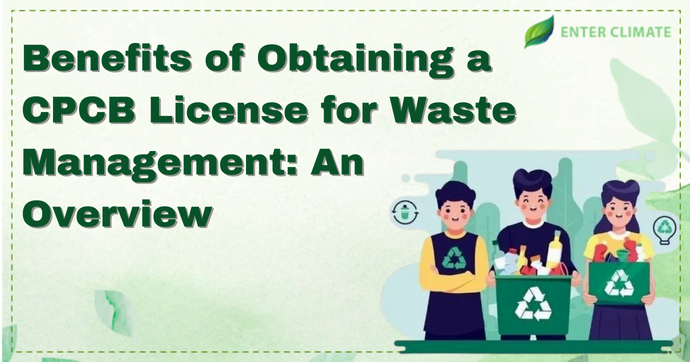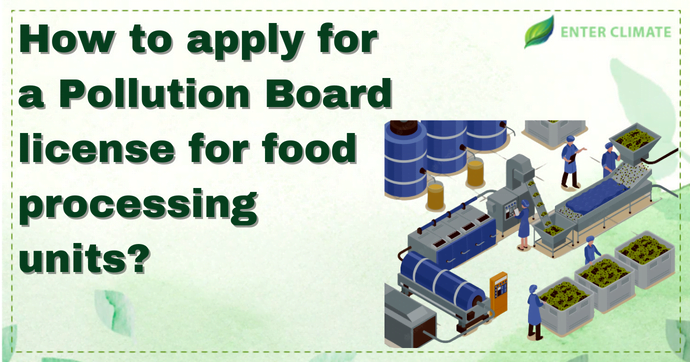Benefits of Obtaining a CPCB License for Waste Management: An Overview
 14 Nov, 2022
14 Nov, 2022 
Today our country faces a severe waste management issue and the control of pollution generated by indiscriminately discarding such waste. As the country’s urban population is expanding, the waste generated by industries that are manufacturing products, development work by private and public and households is also increasing. This waste is not only limited to solid municipal waste but includes distinctive waste such as hazardous waste, e-waste, plastic waste, tyre waste, construction &demolition waste, biomedical waste etc. The Central Pollution Control Board surveys and monitors the pollution-causing human activities and maintains water and air health through checks on the industrial establishment through the SPCBs/PCCs. While CPCB is the nodal authority in the country for waste management and issuing CPCB License for Waste Management, it has delegated many of there responsibilities to the SPCBs and PCCs of the states and UTs of the country, as this ensures a check mechanism at the source of waste generation. So a dedicated Pollution Control board for each state was deemed better equipped to handle waste management. In many cases, such as C&D waste management and e-waste management authorisation (for recyclers, refurbishers etc.), the power to issue licences and authorisation lies with the concerned State Pollution Control Boards. However, the Central Pollution Control Board reserves the authority to issue the necessary CPCB Licenses for Waste Management activities with pan-India applicability. The CPCB has significant roles in the following areas
- EPR Authorisation (for PIBOs involved in the EEE, Plastic Packaging, Rubber Tyre and Battery Business)
- Giving authorisation to Producer Responsibility Organisations (PROs)
- Environmental clearance (for projects that have been notified under the EIA Notification of 2006)
- Export and Import Authorisation for Hazardous Waste
- Export and Import Authorisation for E-Waste
- Export and Import Authorisation for Plastic waste
- Certification to Compostable Plastic Product manufacturers and sellers
- Battery Import Licence (for all types of Batteries)
Roles and Responsibilities of CPCB
The application process for issuing licenses, waste management authorisation, registration of entities and managing the EPR obligations are being made digital by introducing centralised online portals that CPCB manages. However, the benefits of obtaining a CPCB License for Waste Management are many, apart from its essential requirement for running your business. As the Board advises the Central and State governments on preventing, improving and controlling Air and Water pollution, obtaining a CPCB License for Waste Management business activities mentioned above stands necessary. CPCB also provides technical services to the Ministry of Environment, Forest and Climate Change. The principal functions of the CPCB have been given in the Water (P&CP) Act, 1974[1] and the Air (P&CP) Act, 1981. The CPCB has been playing a pivotal role in the following areas of pollution control and waste management
- Promoting cleanliness of water resources (streams, wells) in different areas of the States by control, prevention and abatement of water pollution
- Improving the quality of air and preventing, controlling or decreasing air pollution in the country
- Advising the Central Government on the concerns involving pollution and planning nationwide programs to prevent and control water and air pollution.
- Coordinating the activities of the State Pollution Control Boards (SPCB) and providing dispute redressal along with technical assistance to the SPCBs.
- Planning and organising training of persons and managing mass awareness programmes on the control, prevention, or abatement of water and air pollution.
- Compile and publish technical and statistical data on air and water pollution and the measures devised for effective prevention, control or abatement.
- Prepare manuals, codes and guidelines for the treatment and disposal of trade effluents and stack gas cleaning devices, stacks and ducts.
- Issue new quality standards for the stream, well and air, or annul them through consultation with the State Governments.
- Perform any other function as assigned by the Central Government.
Advantages of Obtaining a CPCB License for Waste Management
If an entity is dealing in the waste management business, complying with the licences and permit requirements makes their business compliant with environmental norms and Acts and regulations of the country. The benefits of obtaining a CPCB License for Waste Management are as follow.
Benefits of EPR Authorisation: As per the E-waste management Rules of 2016, CPCB can grant, renew or refuse EPR-Authorization to Producers of the Electrical & Electronic Equipment (EEE) listed in schedule — I of the said Rules. Similarly, EPR Authorisation is also required by producers of plastic, battery and tyres. As per the latest amendment to the Hazardous Waste Management Rules and Battery Waste Management Rules have identified producers as entities responsible for managing waste generated through the end-of-life of their products. If an industrial unit is required to obtain EPR authorisation, it must approach the Central Pollution Control Board for CPCB License for Waste Management with the following documents
- GST Certificate
- Importer Exporter Code (IEC)
- Ownership documents of the site (rent or lease proof)
- Memorandum of Association
- Details of imported products like EEE code, quantity imported etc.
- Form 1 for EPR authorisation
- EPR plan copy of permission from relevant Ministry/ Department for selling their product.
- Copy of agreement with dealers, collection centre, recyclers, treatment storage and disposal facilities
- Copy of trade licence issued by Directorate General of Foreign Trade.
- Self-Declaration, including the importer’s name and authorised person, brand name, and contact details
Granting Authorisation to PROs: for managing EPR for Producer, Importers and Brand Owners (PIBO), the CPCB License for Waste Management in the form of EPR authorisation is required. Allowing Producer Responsibility Organisations (PROs)to handle the responsibility of waste management by the end-of-life of identified wastes (e-waste, plastic waste, tyre waste etc.) gave many recyclers and dismantlers an opportunity to become PROsand diversify their business. This also helps keep the increase in the cost of new products small as a specialised entity managing EPR for a business throughout the country will mean that businesses won’t need to install separate collection, dismantling and recycling centres for their used product. A PRO for authorisation needs to submit the following documents to the CPCB
- Name and address of the PRO
- Name and address of the authorised person
- The category of the waste the PRO will be handling
- Details of Channel Partners
- Collection, storage, transportation, capacity, as well as the capacity of dismantlers and recyclers with whom PRO has agreements.
- PAN and GST Registration
- Organisational Structure details and Process flow chart of waste management.
- Details of the collection mechanism
- Functional website and toll-free numbers of the facility.
3. Environmental clearance (EC): Environment Impact Assessment (EIA) is a crucial report for environmental clearance needed for specific projects like mining, river valley, thermal power plants, infrastructure developments like highways and roads, ports, harbours and airports, and small electroplating industry or foundry units. Any project related to the above categories can only start working or amending existing projects after obtaining Environment clearance from the concerned Authority under MOEF&CC and the CPCB. The EIA for a development project is compiled according to the TOR during the scoping stage. Documents that need to be submitted for EC include
- Detailed Project Description
- Site/ Layout plan
- Proof of installed machinery
- Proof of Land Ownership
- ID proof of Signatory
- Quality test Report (wherever applicable)
- Proof of mitigation options adopted
- Proof of Electricity and water connection
Conclusion
Any industrial unit that generates industrial waste and, thereby, releases pollutants in any form into the environment needs registration and CPCB License for Waste Management to legally function in the country. However, the CPCB has delegated various authorisations and licences to the concerned SPCBs for proper waste management. Therefore a clear idea of whom to approach becomes essential for entrepreneurs that seek environment-related licences and permits for their waste management business. Guidance and assistance from licencing experts who can manage such legalities prove a time-saving and economically sound practice if seeking a CPCB License for Waste Management.
Read our Article: Pollution NOC for bank loans: An overview legal requirements for business loans













